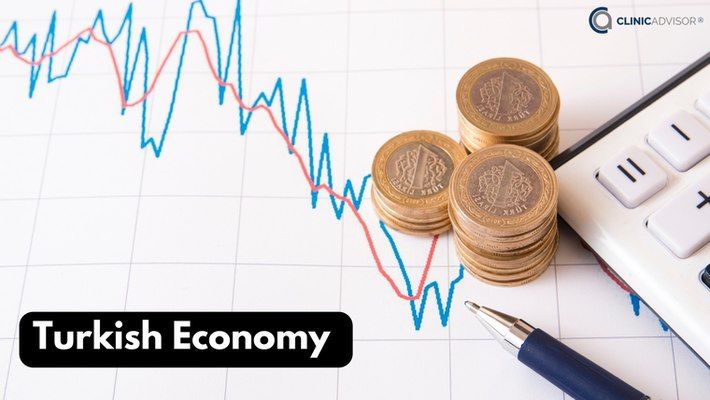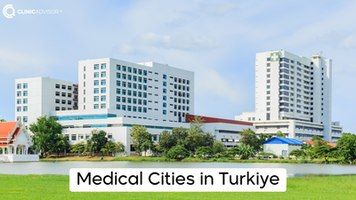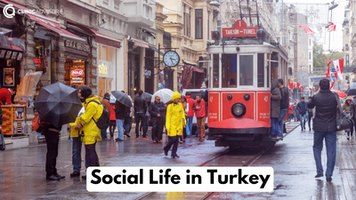The Turkish economy is based on a mixed model that integrates the capitalist economic system based on the free market and state intervention. Turkiye is a member of the G20, a group of the world's largest economies, and uses the Turkish lira as its official currency.
Turkiye, being a developing country, is ranked twentieth in the world in terms of economy, according to research results based on the exchange rate of the Turkish lira against the US dollar. According to the Global Competitiveness Report published by the World Economic Forum in 2019, the Turkish economy ranks 61st out of 141 countries with the highest competitiveness. Turkiye was able to maintain its ranking among the top 100 countries in the Global Competitiveness Report with its economic developments in 2018, 2019, and 2020.
Although the Turkish economy is facing some difficulties, the country remains an important economic center in its region, especially due to its strategic geographical location. In 2020, Turkiye ranked 28th among the countries with the highest trade volume, with a total trade value of $335.2 billion. The backbone of the Turkish economy consists of industries such as automobiles, textiles, food products, and electronics.
What is Turkiye's national income?
Turkiye's national income was $713.7 billion in 2016, $850.7 billion in 2017, $771 billion in 2018, and $754.4 billion in 2019. And about $720.9 billion in 2020. In 2021, the rate Turkiye's national income growth is 5.5%.
What is Turkiye's ranking in the global economy?
Turkiye ranks as the 19th largest economy in the world, with a GDP of approximately $906 billion.
What is the unemployment rate in Turkiye?
The unemployment rate in Turkiye has fluctuated over the past few years. In 2016, the unemployment rate was 10.9%, rising to 11% in 2017. It continued to rise in 2018 to 11.1% and then to 13.7% in 2019. Due to the impact of the Covid-19 pandemic, it is estimated that the unemployment rate in Turkiye to 13.9% in 2020.
What is the inflation rate in Turkiye?
Turkiye's inflation rate has fluctuated significantly in recent years due to various economic factors. In 2016, the inflation rate was 7.78% but rose significantly to 11.14% in 2017. The inflation rate continued to rise, reaching 20.30% in 2018, before falling slightly to 15.18% in 2019. In 2020, with the effects of the Covid-19 epidemic, the inflation rate was about 12.61%.
What is the currency of Turkiye?
The official currency of Turkiye is the Turkish Lira (TL). Turkiye is not part of the European Union, so it does not use the euro.
What is the abbreviation of the Turkish currency?
The international abbreviation for the Turkish Lira is TRY.
What is the currency exchange rate in Turkiye?
As of July 2023, the exchange rate of the US dollar against the Turkish lira was 26.78 Turkish lira.
What banks are there in Turkiye?
There are many prominent banks in Turkiye, both locally and internationally. Among the largest Turkish banks are Ziraat Bank, Türkçe Bank Vakif, Garanti Bank, and Akbank. International banks operating in Turkiye include Citibank, HSBC, and ING Bank.
Where is the Central Bank of Turkiye located?
The Central Bank of the Republic of Turkiye is located in the capital, Ankara.
What foreign banks are there in Turkiye?
There are many foreign banks operating in Turkiye. These include:
- HSBC Bank A.Ş.
- ING Bank A.Ş.
- Citibank A.Ş.
- Garanti BBVA (partly owned by the Spanish bank BBVA)
- QNB Finansbank (owned by Qatar National Bank)
- Deniz Bank (owned by Emirates NBD)
It should be noted that some of these banks are wholly owned by subsidiaries, while others are partly owned by their foreign parent company.
What is the minimum wage in Turkiye?
As of 2023, the minimum wage in Turkiye is approximately 11,402 TL per month.
What are the weekly working hours in Turkiye?
In Turkiye, the standard work week is 45 hours, usually divided over six days, with a legal limit of 11 working hours per day. However, it is common for many companies and industries to operate a five-day week. Overtime is permitted, although it does not exceed 270 hours per year.
What are the main sources of livelihood in Turkiye?
The Turkish economy is diversified, with major sectors including automobiles, textiles, electronics, tourism, agriculture, and mining.
How is the industrial sector in Turkiye?
Turkiye's industrial sector is diverse, including automobiles, textiles, food, machinery, chemicals, and electronics. It is now one of the world's leading manufacturers in many industries.
How is the automobile industry in Turkiye?
Turkiye is one of the best automobile-producing countries in Europe and the world. The automotive industry is one of the main driving forces of Turkish exports, with many local and international manufacturers operating within the country.
How is the Turkish textile industry?
The textile industry is another vital part of the Turkish economy. Turkiye is one of the world's leading countries in the production of textiles and clothing. This sector is known for its high-quality cotton textiles, as well as wool, silk, and synthetic products.
How is the construction sector in Turkiye?
The construction sector is an important part of the Turkish economy, contributing significantly to the country's GDP. Turkiye has a strong domestic construction sector, and Turkish construction companies also undertake many projects abroad.
How is the Turkish agricultural sector?
Agriculture plays a vital role in the Turkish economy, providing a large number of jobs and a large portion of the country's exports. Turkiye is one of the world's leading producers of a number of agricultural products, including hazelnuts, cherries, figs, apricots, and tea.
How is the Turkish service sector?
The service sector, including sectors such as tourism, medical tourism, communications, finance, and transportation, is an important part of the Turkish economy. The tourism sector, in particular, is a major source of income for the country.
How is the tourism sector in Turkiye?
Turkiye's tourism sector is one of the most vibrant in the world, thanks to its rich history, diverse culture, and stunning natural beauty. The country is home to a variety of tourist attractions, from the historical and cultural sites of Istanbul, such as Hagia Sophia and the Blue Mosque, to the beautiful beaches of Antalya, and the unique landscapes of Cappadocia.
How is the Turkish energy sector?
Turkiye's energy sector is diverse and includes significant production of coal, hydropower, and renewable energy. However, the country depends on imports for most of its oil and natural gas needs.
How is the pharmaceutical sector in Turkiye?
The pharmaceutical industry in Turkiye is one of the largest industries in the Middle East and North Africa region. The country has a number of large pharmaceutical companies that manufacture generic and branded medicines.
What is Turkey's export policy?
Turkiye's export policy is guided by the Ministry of Trade, with a strong focus on increasing the value of exports, diversifying export products, and expanding into new markets. Major export products include vehicles, machinery, and textiles.
What are the Turkish export numbers?
In 2021, Turkiye's exports were valued at approximately $185.5 billion, which represents an increase from $170.1 billion in 2020.
What are Turkiye's export products?
Turkiye has a diversified export portfolio. The country is known for its agricultural, textile, automobile, and industrial goods. Here are some of Turkiye's main export products:
- Vehicles: A large portion of Turkiye's exports is thanks to its strong automobile industry.
- Machinery and Equipment: This includes construction and agricultural equipment, and household appliances.
- Iron and Steel: Turkiye is a leading global producer and exporter.
- Textiles and Clothing: The Turkish textile industry is globally recognized for quality and design.
- Agricultural products: especially cherries, apricots, tomatoes, peppers, olives and hazelnuts.
- Natural Stones: A leading source of natural stones such as marble, travertine, and travertine.
- Jewellery: Gold jewelry and other precious metals constitute an important part of Turkiye's exports.
What are Turkiye's imported products?
Turkiye's main import products include machinery, chemicals, semi-finished goods, fuel, and transportation equipment. In 2021, Turkiye's imports amounted to approximately $236.2 billion.
What is Turkiye's import policy?
Turkiye's import policy is generally liberal, with an emphasis on supporting the local economy and ensuring consumer safety. However, there are regulations and tariffs on certain goods and categories to protect local industries.
What is the distribution of Turkiye's basic economic data by years?
Turkish economic data has witnessed significant fluctuations over the years due to different domestic and international economic conditions. The country's GDP was approximately $851 billion in 2016, $880.4 billion in 2017, $784.1 billion in 2018, $761.4 billion in 2019, and $720.8 billion in 2020.








